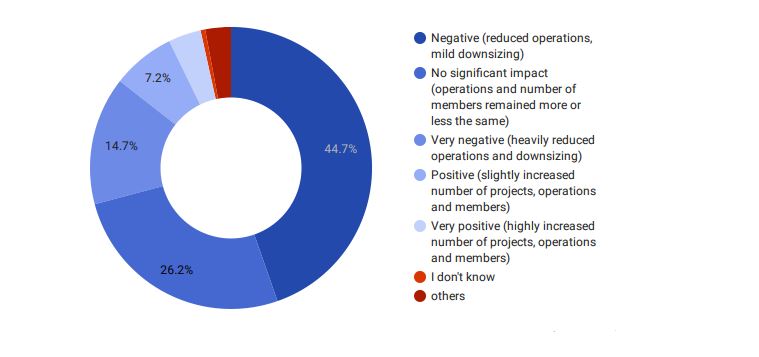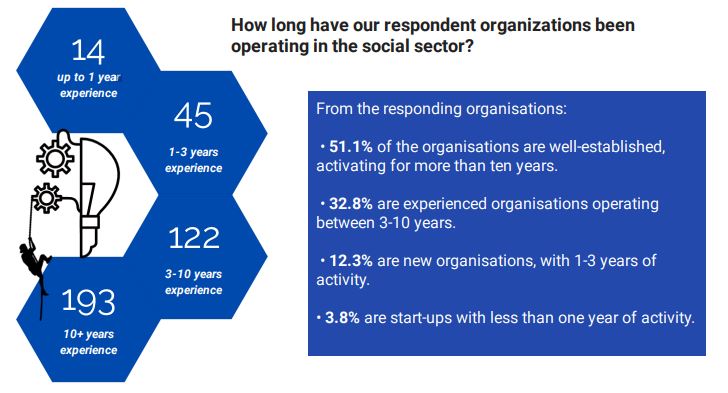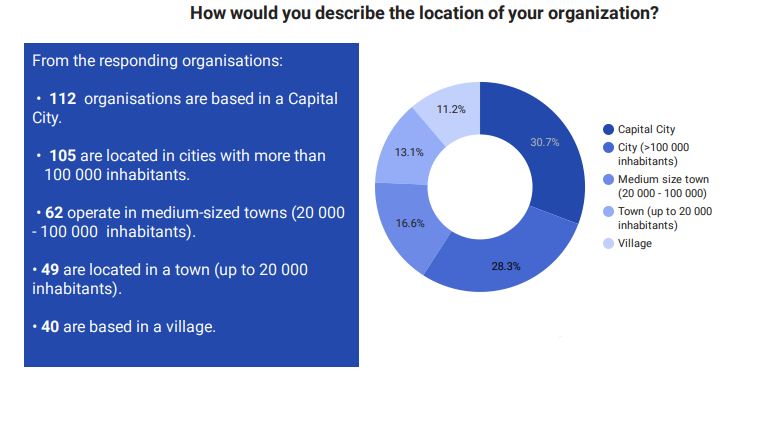The COVID-19 pandemic has profoundly impacted non-governmental organisations (NGOs) across Europe, affecting their financial stability, operations, and ability to provide services to communities in need.
According to recent data we accumulated in a recent survey for the E-volunteering Erasmus+ project, many NGOs have experienced significant reductions in funding as a result of the pandemic, leading to difficult decisions about staff cuts and reductions in services. Additionally, the pandemic has forced NGOs to adapt to new ways of working and has made it harder for them to connect with volunteers and communities.
This article will give you a closer look at those challenges. Let’s get to it.
About The Survey
Our report consists of 374 responses from NGOs of various sizes in 46 countries around Europe that are active in different social areas. The survey had 18 implicit and explicit questions that measured the degree every organisation was affected by the pandemic. Additionally, the qualitative and quantitative data were accumulated by the partners of the project.
The Main Challenges European NGOs Faced During the Pandemic
Financial Challenges
One of the major impacts of the pandemic on NGOs has been financial losses. With the economic downturn caused by the pandemic, many NGOs have seen a decrease in funding from governments and corporate sponsors. Additionally, the pandemic has caused a drop in donations from individuals. This has resulted in many NGOs making difficult choices about downsizing staff and cutting services to stay financially afloat.
However, our survey showed that the bigger the organisation easier it was to adapt to the new context. Particularly, It seems that SMEs were the ones affected the most. Thirty-four small organisations reported very negative consequences, 89 had some negative impact and only 48 the SMEs that saw no severe changes.

Reductions in Operations
The pandemic has also affected the operations of NGOs. With lockdowns and social distancing measures in place, many NGOs have had to shift their operations online or adopt remote working models. This affected their day-to-day operations and made it more difficult for them to connect with volunteers and communities in need. Additionally, many NGOs have had to cancel or reduce in-person activities and events, further impacting their ability to provide services to communities.
Limited Their Capacity
Furthermore, the pandemic has also affected the capacity of NGOs to provide essential services to communities in need. Many NGOs have had to reduce or cancel their in-person services, such as providing food and shelter to the homeless and education and support to refugees and other marginalised groups. Additionally, NGOs have faced the challenge of addressing communities’ increased mental and physical health needs during the pandemic.
The Solutions to These Challenges
Despite these challenges, many NGOs have been able to find innovative ways to continue providing services to their communities:
Improved Their ICT Capabilities
Some have shifted to providing services online or through mobile apps, while others have adapted their services to meet the unique needs of communities during the pandemic. What was true for most of them was that they were unprepared to deal with such a situation and had to adapt quickly. Additionally, many NGOs have stepped up to provide essential services to communities in need, such as delivering food and medical supplies to isolated individuals.

At the same time, most of their activities were conducted on the field before the pandemic, whereas the pandemic forced them to go online.

Started Collaborating More
The pandemic was new for all organisations globally, and the solutions they had to come up with were pretty much applicable everywhere. That’s why it was an excellent opportunity for NGOs to collaborate and share resources and expertise in addressing the unique challenges caused by the pandemic. Some NGOs formed partnerships to amplify their reach and impact and support under-resourced communities.
Conclusion
In conclusion, the COVID-19 pandemic has significantly impacted NGOs in Europe. Many NGOs have experienced financial losses, operational challenges and difficulties in providing services to communities in need. However, despite these challenges, many NGOs have been able to find innovative ways to continue providing services and have stepped up to meet the needs of communities during the pandemic. It is crucial for NGOs to continue to monitor and adapt to the evolving situation and for governments and other stakeholders to provide support and resources to help them continue their vital work.
If you are interested to learn more about the challenges NGOs faced during the pandemic, you can read our Europe-Wide NGO Pandemic Impact Survey Report.



